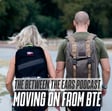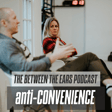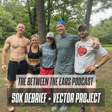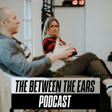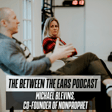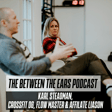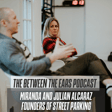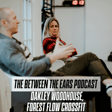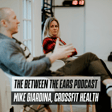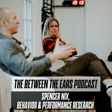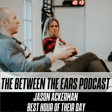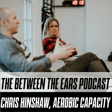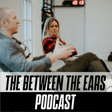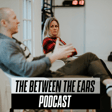Become a Creator today!Start creating today - Share your story with the world!
Start for free
00:00:00
00:00:01

ETHOS Debrief
K and I discuss the past weekend's seminar and event, ETHOS. We have struggled and floundered for years trying to explain what it is we do, but words just fall short. Words simply are not the primary language of BTE. But, we have to use them so we process, share, and hopefully communicate what ETHOS is, why it was a powerful weekend, and our plans for sharing this powerful experience moving forward.
Next in person ETHOS at BTE is December 3-4. As of recording there are only 6 spots available.
Learn more at ethos.btwntheears.com
Transcript
Introduction to Ethos and Podcast
00:00:01
Speaker
Hello? Hello. We're back. Season 522. Yeah. We are back. We're back after a good, dare I say, great ethos weekend. That's
Challenges of Communication on Social Media
00:00:24
Speaker
what we're going to kind of talk about today.
00:00:29
Speaker
Yeah, we're going to no warm up. Just jumping right in. Just jumping right in. We're not giving an update on our life. That's just no one cares. But the ethos update, it's good one because it's relevant. Yeah. Um, yeah. So we thought we would dive into kind of what, what is ethos? Um, you know, I put up a post today about social media and I didn't see this post. Yes. Um, that's what I'm going to tell you.
00:00:58
Speaker
It's challenging. It's, I mean, let me say this, social media is challenging. Period. End of sentence. That's a kind, that's a kind sentence.
00:01:07
Speaker
Yeah, and that wasn't really what my post was about. But what we find hard is trying to communicate what we do in such a quick, succinct fashion. I think if you're selling coffee and cinnamon buns, you put up a great picture, immediately people want this item. It doesn't take a lot of
00:01:33
Speaker
But for what we do, it can be definitely tricky to have the right words to communicate what it is we're doing, whether it's an event or what between the ears is. I think that's our failure though, because we're trying to use words and we're setting ourselves up for failure because words and language are different.
00:02:00
Speaker
words are an extension of language. It's a form of language. What we do is not contained to words, but the medium through which we have to communicate to the people out there are words. Okay,
Exploring Ethos' Unique Experience
00:02:22
Speaker
sure, pictures, video, yeah. But the language in which we communicate is not words.
00:02:30
Speaker
And it's challenging because we have to play the game and we do have to use words. And then the words that are getting used. Yeah, they're loaded and right.
00:02:42
Speaker
So that is why today we thought it would be helpful to use some more words. Spoken versus written. Yeah, just tone of voice communicating something. Yes. And also maybe
00:03:01
Speaker
Decipher or get into details of kind of okay, what makes what makes this what makes ethos different than maybe other things that we've done because we've done a lot of whether it's events or seminars so Starting out we're gonna dive right into like well, what is ethos? How did we get to this seminar? Yeah
00:03:23
Speaker
We, I think first to answer that, looking at words and meaning of words, but that's kind of what between ears does in a sense is more on the meaning sense, not the words. Ethos, the definition of ethos or a definition of ethos, the characteristic spirit of a culture era or community as manifested in its beliefs and aspirations.
00:03:53
Speaker
The spirit part of that is so huge. Beliefs, aspirations, the manifestation element, bringing them to life through action. That word ethos, we think perfectly captures an experience that we create, share, and guide people through.
00:04:23
Speaker
to conjure up this spirit of between the ears. What the heck is it? How do you do it? What's going into it?
00:04:38
Speaker
Because it's not, like we've said, it's not just a workout. It's not just a piece of equipment. It's not just an overnight thing. It's not just journaling. It's not just riding with a blackout mask. It's those things. Well, even if you ask all the people who attended this weekend, they will probably say their experiences aren't just, even though they went through the same course. Yeah.
00:05:05
Speaker
it was different. So that spirit is individual, it's not really a tangible point to this line item type of thing. Yeah,
Personal Growth Through Ethos Experiences
00:05:16
Speaker
and it's not a predetermined outcome.
00:05:23
Speaker
Hey, I'm going to go to this training course. I'm taking EMDR next week for, you know, as the, as a therapeutic intervention, taking a full week intensive, um, course on it. The course starts on Monday. It ends on Friday at the, going into the course on Monday, best case scenario, I could have read the book.
00:05:48
Speaker
perhaps had the EMDR performed on me, although I haven't, um, you know, taken other things, but that course at the end of that course, you'll be able to now safely effectively and professionally and all of that stuff. Administer that. Administer that treatment. Of course you need ongoing supervision and, and, and, you know, you're not just an expert after you've taken the course, but like, okay, here's the skill that you're going to walk away with. Sure.
00:06:18
Speaker
We're not that. It's not so concrete. It's not so predetermined. Yeah. I do think there are some things that we can get into. That can be challenging to say it's a spiritual experience. It's individual. You can't really predetermine, but there are some things we can say, this is sort of what it's about.
00:06:47
Speaker
our
Defining 'Between the Ears' and Personal Interpretation
00:06:48
Speaker
hope for people. It's not just a complete black hole. No, no, no. That's like getting into, you know, it's embracing this spirit of between the ears. That is something that each individual is going to experience differently. But we have some things that, um, sort of intentions for the weekend.
00:07:09
Speaker
Yeah. And it leads to a better question of, okay, well then what is this between the ears thing? And that's sort of, that's the key question. And as we've been challenged to define that, recognizing that words are a limitation, but they're how we have to share it.
00:07:31
Speaker
what the heck is between the years because people will say, oh, that was like a between years workout or that was a BTE experience. Or I channeled my inner BTE during a thing that's not related to BTE or someone who hasn't participated in events or programs or just sees a post and it speaks to them. And that's the beauty of it. There's not necessarily this ownership per se. Somebody can see
00:07:58
Speaker
It means something to, it means something different to every different person, but there's commonalities shared across. And there's things, exercises, concepts that we introduce in the weekend that frame that for people, right? Provide them that opportunity. So this is like our kind of capstone, not capstone, but like our, it's our one-on-one, it's our cross at level one for between the years. It's our, you know, kind of,
00:08:27
Speaker
fundamentals of what goes into this approach that is between the years, and what's the purpose of it? And the purpose of it, sort of our mission statement, is to engage in a movement practice that raises awareness of connection to an expression from the self. Yeah, and I think to differentiate between, well, there's been other weekends, other events. There have been. Some of them have been
00:08:56
Speaker
much more about the movement practice without maybe as much of the framing and the concepts or the time to process. Some of them have been concepts that are very much
Movement Practices and Personal Development
00:09:08
Speaker
ethereal without the skills or the tools or kind of Monday morning like, okay, how do I really apply this? And what I think we really have gotten to with this ethos weekend is all those things in one. So we have
00:09:24
Speaker
movement practices that kind of can dovetail into these concepts and people can experience them with movement. And then we also have, you know, concepts, but with the concepts, actual tools to say, okay, it's not just a weekend where you have this incredible experience. And then Monday morning,
00:09:46
Speaker
you're kind of just like, well, what do I do from here? So I think we've gotten it to a place where people on Monday, regardless of what they do for fitness, regardless of where they're at in their life, like they are walking away with some good stuff to help them moving forward.
00:10:08
Speaker
Yeah, and I think leading up to this point, between there started as a, I wonder if anybody's gonna show up to the gym. You told me get off your ass and actually do this thing you've been talking about for years. And it started as, hey, how do we challenge people using the unknown, using fitness, using movement, using some environmentals, random stuff people have either never seen before or never tried to do, how do we get,
00:10:37
Speaker
the awesome awareness raising experience of the unknown and of adversity. How do we bring that into the kind of Friday night? And that's where it started. That was like sort of the seed.
00:10:54
Speaker
And it grew into events and some pretty fucking elaborate events where like, yep, like get in the van. We're going this way. And then three and a half hours later, we're in the middle of nowhere. And it's like, what? Like, this is this is like a legal kidnapping. And at the end of the weekends or the events, people would be able to say, I did this thing over the course of the weekend. Would you do this? I did this. I did this crazy thing.
00:11:24
Speaker
I think, you know, at the end of ethos, we want people to say, Hey, I had this experience and I'm going to be, and I'm doing this thing moving forward versus like your Iron Man. Great example. You trained up for your Iron Man. You did the Iron Man, the Iron Man, you know, Corial
Long-term Benefits and Community Support
00:11:43
Speaker
Andes, you are an Iron Man. Do they say Iron Man or Iron Man? Oh, okay. Oh, well, okay. Cancel.
00:11:51
Speaker
Anyway, yes, in that experience. But that was it, right? You can take that with you, like, wow, I did that hard thing. But there wasn't like a tool necessarily or a skill that
00:12:06
Speaker
you know, like, okay, I'm taking that with me now on my day to day, or it's sort of like, that's, and that's great. There's, those are super valuable. Without a doubt. Yeah. And I'm definitely not poo pooing them because it's like, no, no, no. You like did the thing. You trained up for it. You signed up for it. You paid money for it. You, you know, did everything. Now you were in the arena. You did the thing. There's tremendous value. Like there's part of that in this weekend. That's what's nice is that,
00:12:34
Speaker
the ethos weekend has that as one component. Yeah. Right. The follow through. That's why we call it really between years really is more about a movement practice, not just a journal, right? Not just I work out this way. I use these tools. I do these types of workouts. It's all, all are welcomed. Um,
00:12:59
Speaker
It's really that practice element. So for people to have that, which is, again, the spirit of this culture and beliefs and movement, really, it's an approach. And so we want people to walk away on Sunday and wake up on Monday and maybe after a few days of processing, like, what the hell just happened? Because it was every bit also part of like a, it was,
00:13:25
Speaker
very much like a psychedelic experience as well for people where raising or opening of the mind, that's what that means. It doesn't mean tripping your face off. It's that opening of the mind component where all of a sudden now you make contact with this thing that not just you and I, we, but we as humans call the self, capital S.
00:13:51
Speaker
What is that thing? And that thing that is indescribable and is this duality between it's a tangible thing, but it's also intangible. That's where we're going. And to have the follow through and to give people a frame and tools and different things from a programming standpoint to
Mindset in Fitness and Personal Development
00:14:15
Speaker
where we say, hey, if this weekend is
00:14:19
Speaker
kind of like a psychedelic experience and your big dose of like, whoa, what happened? That's what happened on Saturday and Sunday, more so probably on Sunday, but definitely both days in conjunction with one another. The follow through and the practice and the stuff on Monday and the next days, weeks and months is the micro dosing where it's a, there's sub perceptual changes that are happening. So that's the, that's where then you go into your gym or your whatever,
00:14:50
Speaker
and you subscribe to this approach for yourself. And in doing that, you make some pretty cool progress and opening up of this thing.
00:15:09
Speaker
Yeah, so how we do that, and is through some movement practices, there is some just to kind of be tangible with like what not to get into like everything that happens, because of course, that's sort of are going to outline every single, you know, thing going on. But we do teach some concepts. We teach those tools that are like, okay, this is the concept, but now
00:15:36
Speaker
how do you go about using it on Tuesday when you're struggling or something, you can reference back to that tool or that model or that skill of working on something. And then, of course, there is some journaling. But I think one of the biggest things to also add is there's that connection element. And that's a huge part of. When you say connection.
00:16:00
Speaker
connection to other people, you know, you talked about connection to self, that's one part, but there is something that we know happens in community. And we've talked about that a lot on this podcast. But you know, sharing, there's obviously a safety piece that's like built in that, that comes from you that comes from me that comes from the participants. Yeah, so that's kind of how we go about adding those pieces. And
00:16:28
Speaker
you know, what it is also and relating it back to when you say like, it doesn't really matter what the tools are, what your fitness is, what your what the exercise is. So movement practice,
00:16:40
Speaker
You know, it's all different levels in terms of how people take it away. Some people might be just, it might be a first step to looking at how they can find a little bit more connection to themselves in their everyday fitness, to your point, like the microdosing. Some people are on a much deeper journey at this level.
00:17:02
Speaker
Um, I think what's unique about it is regardless of where you're at with that connection to self, you might be just starting to look at some more deep, you know, meaning, or this might be like another piece of the journey for you that you've been on for a long time and everything in between. Um, so that's kind of, yeah. Yeah. And I think it's important because
Core Elements of Self and Metaphors in Fitness
00:17:24
Speaker
even if someone were to say, so you're telling me, you're not going to teach me how to squat better or get fitter.
00:17:31
Speaker
And it's, it's like, yeah, that's right. We're not. Who the heck is anybody to say that? But regardless of what you do, like you need to, you need to be along for the ride with whatever pursuit you're trying to improve upon. So you're the, the atomic, the subatomic, you are the who you are and the self is the component that is not
00:18:01
Speaker
able to, there's no more reduction. It's an irreducible element. Whether you express that through strength, endurance, CrossFit, powerlifting, or, or you're just like, yeah, I want a fitness practice. I want to, I want to get fitter body, mind, spirit. What does that mean? And fitness is often equated to performance.
00:18:28
Speaker
And that's a whole separate, perhaps conversation where it's not, that's not necessarily the case. You know, David Tyree and I were talking about this on his show where you want to get to the top level. Again, you're training. You're not training mental, like the mental health part is where we start to see, is that really healthy? Yeah. And we've talked about that. Yeah. And it's your, if you're training, you're sacrificing the degree to which you sacrifice.
00:18:57
Speaker
Not entirely, but that is a measure of the degree to which you're training. Do you have an intention? And are you excluding other things involving some focusing on some things and intentionally excluding and sacrificing others? And
00:19:15
Speaker
So what we're doing and what we think is hitting on multiple different components of fitness, physical, mental, emotional, social, is having that fundamental irreducible unit of the individual be what we're kind of accessing. We just do that through workouts. We do that through intention. Do that through some of the tools, models, and practices that
00:19:44
Speaker
that we teach and arm and equip people to say, hey, go do good things now. We're not a crutch. We're really good at helping people walk and improve their gait so that if they need to walk, then they walk. If they need to run, they can run. If they need to sprint, they can sprint. But the gait is what we're training.
00:20:10
Speaker
So what actually happened this weekend, I think, what were some of the takeaways? Obviously, we had six participants for Between the Ears Fitness hosting this. We like to keep it small, six to eight people. And obviously, we're not going to get into what each person's experience was. But we think it's valuable to kind of say, OK, I get it, this sounds
00:20:37
Speaker
great, the self, all these ethereal concepts, but what actually kind of happened over the weekend. So kind of a run through of, you know, the itinerary, so to speak. One of the things
00:20:51
Speaker
that Saturday had as a goal was a little bit more heavy on the education piece. We start with just a little bit of an introduction kind of to what you just spoke about, like between the ears. It's kind of cool that it's getting thrown around as, oh, that's like a BTE thing. This is BTE. People have their ideas of what it is. But what does it mean to the people that were sitting there? What were their intentions?
00:21:19
Speaker
for coming? What was their curiosity about? And then we really dive into mindset and... Well, we did a little bit of a movement thing before that. Yeah, we did a little movement thing, I think to kind of highlight
00:21:33
Speaker
and right off the bat connect movement with there's something else happening. A fair
Educational Aspects and Practical Tools
00:21:40
Speaker
amount of the folks at this were familiar with CrossFit. They all had some movement practice. They all worked out. For sure, everyone. But right away, it was a really good icebreaker in
00:21:56
Speaker
OK, this is kind of the workout, so to speak. But there's another component to it, like what was what was behind it. And there was a little bit of a mindset practice.
00:22:07
Speaker
And so that, I think, intro'd us into, like, well, what is mindset? What does that look like? And we've spoken at length about it on the podcast, but we really dive into, like, we present a definition for it, because to date, we haven't heard, like, a one that is out there. And not that ours is it, but it's a definition.
00:22:29
Speaker
And then beyond just talking about it, okay, what does it mean to improve your mindset? What's the kind of, how does the, not too much neuroscience, but just kind of how does this process go and where can we kind of look at that process for ourselves and see, oh, like that's where I need to maybe work or this is kind of a pitfall for me, that sort of thing. And those are the tools that are crucial, I think, that we're talking about on Monday morning.
00:23:00
Speaker
I took away like a big one. That's what's funny about attending these things. You attend one between the ears thing. That doesn't mean that's it. Or you could say the same about anything. You learn it. Unfortunately, it's not like set it and forget it. So digging into that process and some tools that people could take on Monday and sort of start to apply to their life, sure, their fitness.
00:23:30
Speaker
Anything you want to add in the mindset space? No, I mean, everybody when asked is everybody, is anybody not interested in learning, having a discussion about or training this thing called mindset? Right. Nobody raised their hand.
00:23:52
Speaker
So what I'm seeing is everybody does have some sort of interest of like, Hey, I could see where, uh, an intentional deliberate kind of stab at this mindset thing would be of interest to me. Yeah, definitely. Definitely. Definitely. Cool. What is it? No idea. And it's like, and that, and that's not to be, you know, it's the same thing. Words. What are the words that sum up people's experience with it? It's hard to articulate. Yeah. And it's not a, I gotcha. Yeah. Right. It's not that,
00:24:21
Speaker
I know something you don't know. Fuck off. It's not that at all. It's saying, hey, we all agree that this thing of mindset is beneficial, is used. We'd like to do better at it, but we can't define it. And what's going on there? So perhaps if we start with a working definition to provide a foundation upon which to build and iterate and incorporate and include and find holes in and kind of have it like a working recipe.
00:24:51
Speaker
Um, that's kind of what the purpose of that lecture is. And then, you know, kind of going, okay, well, there's this definition, but then what goes into that, what goes into this definition? Let's peel that back. And I think that's where we get to really, and this is where some of the therapy, some of the, uh, neuroscience, some of the past experience stuff that we, that we have philosophy, all of these,
00:25:19
Speaker
this really cool cauldron of influences, but it's in that that if you look at that in the aggregate, it can be really overwhelming. Yeah, and I think it can feel like intangible, like the mind
00:25:36
Speaker
itself. It's not the brain. So we all get that if people were maybe to describe a challenge they have or struggles they have in their life, they all are very much connected to our mind. And so how do we build that relationship?
00:25:59
Speaker
So that, I think, was a really helpful framework to enter into the weekend with. And then, really, for the first time, we define between the ears. What are the ABCs
Connection Between Programming and Mindset
00:26:14
Speaker
of between the ears? And what's cool about those is it's exactly what you started out saying, that these are things that can be applied to whatever movement you're doing, whatever's happening in your life through these
00:26:27
Speaker
you know, anchoring concepts. They're the ethos. Right. That when you look at things through that lens, it's like, oh, wow, like, yeah, I can take that and bring it to life in workouts. A lot of the reason why we like movement as a practice is because it's a lot, it's a, it's a low hanging fruit to practice some of these things versus going right to maybe some of your bigger life challenges. Yeah. We can get the reps in using movement.
00:26:58
Speaker
So we really get into those. And each one of those, what I like about them is, again, there's some models or exercises that we can kind of have in our pocket every day to work through, to use, to look at our life through that lens and say, OK, let me revert back to that. It's not just like, oh, I had that cool experience. And then where's the connection?
00:27:25
Speaker
So I thought that was really powerful and provided a lot of tangible takeaways. And that was a pretty big chunk. And then we did another movement that was a little more involved. There's a lot of different
00:27:50
Speaker
ways to express this stuff, but that one was kind of a unique, we'll call it like a between the ears. There was some room for, because of the length of it, because of the movements, it provided the right environment and pieces to kind of give people a certain room for an experience, I'll say.
00:28:15
Speaker
Yeah, I mean, I just keep going back to this quote that I came across that I was lucky enough to learn very, very early on in my, you know, special operations journey. And it was telling me and I'll forget, show me and I might remember, involve me and I'll understand. It's all cool to say, Hey, here's a definition. Yeah. It's neat to say, here's a model, a frame, a skill,
00:28:44
Speaker
but an experience that involves people, now they get it. Because it resonates at that deeper level, not just, oh, I'm smart, I can recall. And so that's where the workouts that we do throughout the weekend, the movement experiences, all of that bit, it's not just to fuck people up. It's not just to break up the time and get them moving.
00:29:14
Speaker
It's to involve them in the very ethos, the very concepts, models, skills, and tools that we're teaching.
00:29:24
Speaker
so that they have the experience, whatever their experience is. And that's the thing. When asked what is between the ears, I flippantly want to ask people, don't ask me, or that's my answer because ask the however many people who have been through something, what is it to them? And it's our job to say now, obviously, to still it down because not everybody can
00:29:54
Speaker
Not every, there are common themes throughout it. And that's obviously what makes this thing pretty unique, but also in that we are not the end, we are not the destination. We are the starting line for people. We're not their destination. Yeah. Yeah. And I think that worked out what was, um, you know, we set up sort of not an intention, but sort of, uh, Hijiy is keep using the word, but concept or,
00:30:25
Speaker
But framework, after the workout, hearing everybody's experiences, there was some commonality, but people had very different experiences because where they're at, what's happening in their world, in their mind, in their body, it's totally different from person to person. And so that processing afterwards, a little bit of journaling, and then really coming together and sharing, I thought was really cool.
00:30:52
Speaker
Yeah, that was definitely cool. Very valuable. And for people to see that in one workout, the different experiences people
Engaging Participants and Community Support
00:31:00
Speaker
are coming to, and that's because of the mind. It's not just as simple as a bicep curl and, okay, I feel my bicep burning. And just the other thing with that, I think that what's important, and I've found this to be frustrating with other fitness pursuits that I've been involved in.
00:31:23
Speaker
There can be this element of, which I get is maybe a me thing, but it's also after teaching thousands of people, it's a commonality across 99.5% of them. People don't wanna do the thing they're spending time and energy on wrong. And so there's this sort of like,
00:31:49
Speaker
hesitation or tension or trepidation with am I doing it right? Am I doing it right? And one of the things I think that why our sort of mantra or our charter or calling or something that kind of guides and for us and more internally, but like it's educate and power engage. The education isn't what you're doing right necessarily. Sure. The empowerment is a part of like I can.
00:32:19
Speaker
and this is what it means to me, then the engage is the follow through and the honoring of the doing it. And so with the workouts, with the experiences, with the movement type of situations that we guide people through this weekend, there is no right or wrong way of doing it. It's not like you're like, oh, I'm fucking doing it wrong or I'm not feeling it here. I should be doing that. If you take away the skill, that high skill piece to take away that barrier,
00:32:49
Speaker
Yeah, because it's like we, you know, we talked about this on the best hour of their day podcast, but this notion of like one of the triads of, of, of kind of mental fitness being attention, intention and focus and the intention
00:33:10
Speaker
is that experience directed internally. The attention is this external thing that gets your attention, but at, right? At, it's an external thing, at attention. And focus is the ability to orient and sit with and kind of toggle between both for an extended period of time. So I'm focusing on my intention here.
00:33:38
Speaker
I'm focusing on what has my attention or where my, what my attention is going towards. And that is, that is like way more, that's what we're doing. We're using movements and fitness and workouts to, to give that, to have the catalyst for intention, attention and focus.
00:34:01
Speaker
There's no doing that wrong. It's just, what did you notice? What did you observe? What came up? And we do this with our own workouts where I did a workout a couple of weeks. I was telling you and I was like, yeah, I've never been so, I've literally don't know the last time, if ever I was that close to properly quitting. Well, that got my attention. That also exposed awareness of my intention. Yeah. And I think when it comes down to the movements,
00:34:29
Speaker
setting up these workouts. It's not just a fuck you up session. Picking some of the movements if there's that allows people to have attention and intention. If it's a very high skill, sometimes that can get in the way of the intention because you're so focused on the external am I doing it right? So yeah, and if you're so focused on
00:34:51
Speaker
If you're so focused, take the snatch. If you're so focused on every single finite detail of a dynamic, very, very fast movement, you'll be like one of those flip book animations where you're like, ah, wait a second. What's happening? Did you skip something? Too rigid.
00:35:16
Speaker
but if there's so much on the weight and you don't have that balance of like, no, you need to feel like you need to be patient in the first bowl. You need to be explosive in the third. You need to pull up. So it's always this balance between intention and attention. Yeah. However, certain movements have the, just inherently they're maybe dialed up a little bit more on one or the other. Right. Right. And that's kind of,
00:35:42
Speaker
And you can play around with that. So that's an element of variety that we can look at. And that's also one of the things that we recognize and we intentionally program for. Right. That's kind of one of the pieces that determines we don't just come up, throw workouts together willy-nilly. There is intention.
00:36:03
Speaker
Yeah. Which is what we then talk about after that, too, programming. Yep. So then we go into programming. You know, sometimes that word is a little, you know, rigid or loaded, but kind of, okay, we're saying this applies to any movement practice, different states of the body can act differently to states of the mind.
00:36:25
Speaker
that is kind of fact. And we've all had that experience going for a long run, you feel very differently than doing, you know, sled sprints, or, you know, yeah, a fast, dynamic movement like a snatch. So we connected to our self assessment, you know, that's kind of part of it. You know, I think this seminar, we stayed away from getting too deep down the rabbit hole of
00:36:53
Speaker
neuroscience, which was helpful because I think it can be a lot. Like I know not that many people, I can barely get through a Huberman full episode if it's too technical. It doesn't matter to an extent. It's like, tell me what I need to do. No. Right. And I think that depending upon the person,
00:37:18
Speaker
Yeah, it's, and there is an element of trust. If you want to believe us that this is what's science, believe us or don't, but we don't need to sit and prove it to everybody. So yeah, I mean, if you want to, like, if you're, if you're calling it and I understand no one's doing this, and this might sound a little bit aggressive, but just to kind of say the point, one of the things we talk about is the environment that you're operating in. It matters. We like to think that, no, Hey man, I'm in control of me. Bullshit. Your environment
Ethos Weekend Structure and Activities
00:37:45
Speaker
is also conf influencing you.
00:37:48
Speaker
Sure. Now, if you think that that's hocus pocus, then I encourage everybody. Yeah, yeah, go off and go do go look at the go read the research. Go do the trainings, go do this, go do that. Or you can be like, right, like there's some there's some intuitive wisdom, I think, that we also that like,
00:38:11
Speaker
I think that's also why some of this stuff works so well. It brings into awareness and perhaps puts into this thing of like, Oh yeah, okay. It's distilled down where there is this intuitive wisdom. Like, yeah, right. Definitely. Like when I'm out and it's not too much of a leap for people. Um, so that is kind of, you know, a piece that I think is important because we're saying this is a seminar. This is a weekend that can fit into a CrossFit affiliate. It can fit into someone who's just,
00:38:40
Speaker
you know, got their own endeavors, whatever their fitness endeavors are, it's valuable. And we dig into a little bit of like, you know, how you might see this play out on a day to day basis with your fitness. And so that kind of wraps up that wrapped up day one, it's a big day.
00:38:59
Speaker
The way we had this structured was a two-day. The second day was optional. We've talked about, we'll get into that a little bit, sort of what's next with the seminar, but day two was really just set up for three workouts with time to process afterwards. That's the part where
00:39:22
Speaker
It's not mandatory for people to share. It's not like you must open up and tell us what happened after that workout. But what's cool is by the time we got to that day, there was quite a bit of openness, willingness,
00:39:37
Speaker
sharing and vulnerability. Yeah, vulnerability. And people did really look to peel back the layers. So each workout had sort of a concept attached to it. It doesn't mean it was limited to only like you must only consider this. But I liked that that provided a framework for people to look a little bit, you know, get some access to deeper stuff through each of those workouts. And that really took the entire day.
00:40:07
Speaker
Yeah, I mean, the part about this, what I love about ethos, educate, empower, engage. And I'm going to raise both of my hands on this and say there are plenty of times
00:40:26
Speaker
where I just want to sit, ask and see and learn or be spoken to or read the book or listen to the podcast. And it's like, I just don't want to, but it's like, all right, now let's go. And it's like, God, the space between.
00:40:42
Speaker
not the space between your ears, the space between your ass and the chair is in eternity sometimes. It's like, no, no, no. And it's like, yeah, no, but we got to go. The event component, the experiential, the highly experiential, the bigger dose
00:41:03
Speaker
occurs on Sunday. And I think what's important about it is that all day Saturday is also about building rapport, safety, trust, and connection. With the group. With the group, with us, with yourself. Hey, here's some tools. Yeah, you can't jump and that's what we've done in the past is maybe jumped right into that
00:41:23
Speaker
big dose. And not to say people haven't had an experience and gleaned a lot from it, but we think this is a much more effective way to do it that also for the individual, leaves a much more lasting impact. Yeah, for sure. Yeah. Yeah. And that was
00:41:43
Speaker
Yeah, that was all day Sunday. And it was a few hours of moving, broken up. You know, there was, let's say an hour, then we process an hour, then an hour, then we process an hour, then an hour, then we kind of process. So, you know, it's, but it's also not like an overnight thing. And you can go back to life, you know, definitely going to be tired. Definitely going to be tired.
00:42:09
Speaker
but it's not going to be so much so that now life on Monday morning is going to be impossible. Oh God, you know, and, um, yeah. And that was, that was the weekend.
00:42:21
Speaker
So the next question, I guess, would be, OK, now what's next? And really, for us, we, as we alluded to, there's so much value in this for whatever your fitness is. But we kind of have a thought of where we'd like to go with it, where we think it can have a lot of impact. Obviously, we are hosting another one here between the years Fitness and Far Hills in December.
00:42:49
Speaker
And certainly there's people coming from Canada already that, you know, traveling is great. But where we really see it being a force multiplier, as we talk about, is having other gyms host. And, you know, we were just on the best hour of their day, which is sort of primarily a CrossFit podcast with two kind of OGs in the community.
00:43:16
Speaker
And I think we're all saying kind of the same thing that there is this, there's something like whatever the expression is like left on the table here that's not been maybe dug into a lot in the community. And that's where we think we can really provide some growth. So there are a lot of continuing education courses that are tied to CrossFit.
00:43:46
Speaker
or what capacity, gymnastics, whatever your skill is, you're looking to kind of hone in on a little more. And we see our ethos weekend as no different than that, a skill to develop, you know, mindset, agency, kind of how you can
00:44:02
Speaker
be your capital S self within the community of CrossFit. And so that's kind of where we see this going and being able to have athletes, coaches, owners bring it to their affiliate, to their community and dig in a little bit more.
00:44:22
Speaker
I think the, I agree with you and I think the CrossFit community at large, whether or not you go to an official CrossFit affiliate or do CrossFit workouts in your garage or, you know, do a couple of days a week. I
Continuous Growth and Innovation in Fitness
00:44:37
Speaker
think we lose sight of the process that somebody goes through to do those types of workouts. What do you mean by that? What I mean by that is,
00:44:51
Speaker
going into a group setting coming from a wide range of backgrounds, which is the, you know, reality of virtually every CrossFit affiliate, right? To do something challenging, to learn something, to share it together. Like there is an alchemy that occurs when that is done consistently and over time. And that is,
00:45:20
Speaker
within the fitness industry still, even though within the CrossFit industry, it might be like, oh no, this is just all what we do. That's very abnormal. Within society, that is extremely, extremely rare, unfortunately. And so why I think ethos works
00:45:45
Speaker
really well with the type of person who does CrossFit, CrossFit gym, the military athlete, tactical athlete, where people, cause it's this notion of, I'm intentionally going to challenge myself, having coached and run an affiliate and you've been in it forever.
00:46:13
Speaker
The challenge becomes, if we don't continue to sharpen the edge, the knife gets dull. And only like, what is it then that sort of sharpening that edge? What is, what is, and that's the thing that every, especially every affiliate owner who's been, who's owned gym for over 10 years has said, like, yeah, there's just, it's awesome, but there's something left on the table.
00:46:44
Speaker
And I think one of the things that we've been researching, experimenting with, and vocal about is this thing of psychological tolerances. Right. Which is a CrossFit that's in their charter. It's in their thing. It's the part of the definition that sort of gets dropped. And understandably so. Yes.
00:47:12
Speaker
as we've said, it's a tough nut to crack and where do you begin? But I think what's also a distinction is we're not saying, hey, we're gonna come into this seminar, you're a therapist and you leave and with you, you take your credentials and the ability to help people. It's empowering people to have these skills
00:47:38
Speaker
that you don't need, you don't need to be a licensed therapist to, you know, elevate your community and add this, this layer to, um, for people that are interested. And I think that's whether you're talking about longevity, you know, you're talking about continue to sharpen the edge. Like that component just takes your community, takes people's experience just to a whole nother level of value.
00:48:04
Speaker
Yeah, and I think that's where the curiosity and the openness as a requirement, as a prerequisite to get value out of ethos and out of between the years, it just has to be. And personally, sometimes I really struggle because it's probably my own insecurity informed perhaps by discussions and interactions with people.
00:48:34
Speaker
But I oftentimes like I'm aware of past. Okay. I hope this doesn't sound to whatever, but I will talk about like my quote unquote resume for, for context. I'm aware of the fact that for a period of my life, I was a green bride. I dedicated my entire existence to being in special forces successfully did that and lived in that world. And now
00:49:03
Speaker
In addition to just being the sort of thing with between ears, I'm also a therapist and perform clinical psychotherapy with individual clients, kids to adults. There's a hardness and a softness to that. Therapists typically aren't perceived
00:49:29
Speaker
as hard-nosed, steely-eyed, barrel-chested freedom fighters. There's a softness, there's a nurturing, there's an empathy, there's a compassion, which is wonderful and needed. The military thing or the athlete thing, it's kind of like, all right, motherfucker, be a hard-ass. Get that shit done. And both of those go into between the ears.
00:50:00
Speaker
And I hope, I think that the contrast of them, it's a yin and a yang type of a thing. I think that's why it also really does expand. It's an expansive experience for folks. And it's not saying, I really try to like, I probably beat this to it. We're not saying it's our way or the highway because we are anti dogma.
00:50:29
Speaker
And it is about, what does this mean to you? What
Integration and Intangible Benefits in Fitness Communities
00:50:34
Speaker
goes into that though, are some of the experiences, lessons learned approaches, best practices, whatever it might be called that go from.
00:50:46
Speaker
being a special forces operator and a therapist that go from being a, a, how long, how long did you own an affiliate for? 15, 14, 15, 14, 15 year fitness professional, gym owner, small business owner, like opening a business in an industry at a time where
00:51:12
Speaker
Yeah, there weren't a lot of female owners and all of that, but also being a mom, an athlete. And everyone has that within them. Yeah, there's that range, the two ends of that and where they meet is sort of... And so I think that's where... Sorry, if we were to go into that and then in this
00:51:38
Speaker
sort of like affiliate level at that level. And if every affiliate owner knows and can identify probably 10 members right off the top of their head that says, yeah, you know what, these folks would really benefit from just a little bit more softness. Perhaps it is pulling back, perhaps it is doing this, and there's 10 people or however many are right off the top of the head, be like, yeah, you know what, you need to like, you need to like, let's go. Like you need to kind of push the needle a little bit.
00:52:04
Speaker
And that's what some of this is, that's the empowerment part. Yes. And I think the last thing to kind of point out about CrossFit and our, both of our experiences and most people I know who've experienced CrossFit, there is something intangible. We've talked about that as well. There is this,
00:52:25
Speaker
feeling. So while there are the, you know, there's Pookie the clown, there's the representation of CrossFit where it's like, so challenging, and that's kind of a barrier to entry that's been one of the struggles with it is it is hard, it is asking you to do something challenging outside your comfort zone. But then there's this other part that the community talks about where it's life changing. It
00:52:50
Speaker
there's the community, the connection, and that is that hardness and softness. So most people, I think, without maybe being aware of it, experience both of those. That's what draws them in. And this is just another little bit of a deeper dive into that and continuing to grow that because sometimes, to your point, the edge gets dull and affiliate owners have a lot to contend with, with new people coming in who are just
00:53:19
Speaker
everything's wide-eyed and people that have been there forever, what else you got for me? And this is kind of offering the affiliate owner something to provide the gym that not that does their job for them, but that can provide that little nugget for everyone that is needed.
00:53:38
Speaker
I never really appreciated that statement. I know you said it a lot of, cause I mean, you've been in fitness since you were, you've been legitimately working in the fitness industry for over 20 years. And you've said this in the past of like, you know, there is nothing of like, all right, like what else do you got for me? And I don't interpret that as like greedy or hoarding or anything like that, but it's what naturally happens when you adapt to something.
00:54:08
Speaker
Ooh, something new, novel, awesome, nice new toy. It's why the iPhone is on whatever version. Yeah, sure, there's software upgrades and there's better cameras and there's improvement, there's evolution, but what about, right, same thing with fitness. And we talked about this two years ago when, why we're opening up, why we were opening up between the years. But even still, I had a hard time with that being like, well, is that just you?
00:54:32
Speaker
Or is that like a common thing? And then sure enough, he talked to other affiliate owners, even, you know, Jason Ackerman on the best hour was saying like, yeah, there's that thing of like, all right, like, and then you all say the same thing. What else do you have for me? And I think that's where it at the affiliate level or at the, even at the individual level, you know, you've been doing this for so long. Yeah.
00:54:58
Speaker
sprinkling and weaving in a little bit of novelty without it being some sort of like. OK, that was deviating from.
00:55:06
Speaker
Yeah, it's not taking a whole other turn that's like, this is ridiculous. But I think, and not to only be talking about, we think this works really well in a community and a CrossFit affiliate. For sure, people in their garages, the entire, you know, there's an entire community, street parking has, that's a community that's, you know, virtual. Like there are people that are working out in their garages. Like this works for whether you're, you know,
00:55:35
Speaker
on your own at a YMCA gym and you're sort of like, I need something to, you know, the affiliate level. So that's kind of where we're going. Yeah. Yeah. Yeah. Cause it's not what and where it's not what you're doing and where you're doing it. It's how you're doing it and why you're doing it. And so, you know, that's more of that intrinsic kind of
00:55:54
Speaker
Yeah. So kind of the punchline here, if you're listening and you're thinking, I'm interested, we, as we said, we have one December 3rd, 4th here. We're capping
Personal Learning and Vulnerability
00:56:09
Speaker
it at eight people.
00:56:11
Speaker
Right. There's six spots right now. So there's six spots right now. We're giving people plenty of time. Listen, it's never perfect. You're never going to probably have, oh, that weekend I have nothing happening. I was looking for something to do.
00:56:27
Speaker
But part of the experience for sure is a little bit of that commitment and sacrifice. If you belong to an affiliate and you're like, wow, I'd love to bring this to my affiliate. If you're an owner of an affiliate, all those things we'd love to hear from you.
00:56:44
Speaker
kind of looking at 2023 as a year to get out there, hit the pavement and visit some places and meet some people, which is, of course, selfishly awesome to meet new people in the community. And we love that part of what we do. But yeah, any questions or thoughts or whatnot, we're happy to field them. I will also just want to say that we are also
00:57:14
Speaker
you know, we wrote an email about like, we're not the experts you're looking for. And the, one of the purposes or one of the things with that like statement is that we are also in this journey. Yeah, absolutely. We are on the path as well. We're not at the finish line or have finished the workout and is that we don't have it all figured out. We don't have it all figured out or shit's a mess. Um, and we're not just clapping at the end saying you can do it. Yeah. Um, we're right there with you shoulder to shoulder.
00:57:43
Speaker
to the point of my own learning last week where I put myself in the hospital.
00:57:54
Speaker
Okay. Just for the record, you told me last week, you don't have to tell everybody and now you're saying on the podcast, but I think part of it is to, I really want to be open and transparent and say this, we don't have it figured out. No, it's, it's, it's an ongoing learning experience. Just to follow that up and not end the podcast with you put yourself in the hospital. One of your struggles that continues to be a struggle is managing your time, listening to your body. One of the hard parts when you talk about the hard and the soft is
00:58:24
Speaker
you have the ability to ignore signals. We talk about signals of the body and you can go beyond them. Most people wouldn't. They have that sort of regulator that's like, Hey, I probably need to drink some water and eat. You don't have that. You don't listen to that as easily. And so you blew right past that had a crazy day, long day, couple of days in a row, couple of days in a row leading up to it. But then that day was kind of a culmination. Didn't drink a lot of water. Really didn't fuel.
00:58:53
Speaker
a lot of stress, and then you decided to run 11 miles, which had been the longest to date you'd ever run in the sun. And it didn't turn out real well. You were dehydrated. You had to take yourself to the hospital. So we say that to say, we're on our path. You are on your path. And that is something we have, not to say this, but gotten feedback. And back to where we started with the social media,
00:59:23
Speaker
We'd be lying if we said that we're completely immune to posting things on social media and having them appear a certain way. That's just the nature of that. No matter how many times we say we struggle, there's still what appears there and what people interpret. So we are trying to say we are
00:59:43
Speaker
learning with people. I learned a ton this weekend. We continue to have our struggles, but I think that's part of being leaders is being honest about your own vulnerability and nobody wants to be led, I think, by someone that
01:00:02
Speaker
can't even relate and says they have it all figured out because then you really don't know how to connect to people that are struggling. So we're right there. Yeah. Yeah. And maybe just to finish it, one of the things we talked about this weekend is that look, every one of our ethos or one of our like things is that everybody's a student and everybody's a teacher. Yeah. And it's an invitation to learn and to teach, to acquire and to share.
01:00:33
Speaker
And that applies to us and it very much is a round table sort of situation. Let's have a discussion at a lecture. Yeah. Um, and that's where really some of the cool stuff pops up. And there is that element of like, you know, because it's also not therapy, we can disclose, I can say, yeah, Hey, this whole thing of like, maybe like one of the most challenging things for me,
01:01:01
Speaker
is to listen to the softer side. And is to not, because I have the ability, for whatever reason, to say, yeah, I'm going to blow by that and put myself into the ground. And it was not, like, I was very, very thankful that it was not Rabdo.
01:01:31
Speaker
despite the fact that I was pissing apple cider. And that was really like, but there was that moment when, especially when they're like, okay, sir. I was like, look, I need my CPK levels tested in two bags for sure of an Ivy. And then I peed in the cup and I was like, Oh shit. Now there's organ damage. Thankfully it was just severe dehydration, but it was, and it was one of those things I was laying there in the, in the, in that bed being like,
01:02:00
Speaker
how many times are you gonna have to learn this? How many times? And, you know, I think that's also informs like why we're hopefully, hopefully people feel like that compassion, not like you're doing the wrong thing, or you're not, you know, can't believe you haven't figured it out yet. No, because there is a little bit of that, I think with any type of, you know, teaching elements, like, Oh, well, the teachers never make mistakes, or they got it all. And it's like, and we've, you know, we've taken certain plenty of courses on that, where it's like,
01:02:30
Speaker
No, I mean, we're right there with you. So. Yeah. Well, we hope to hear from some of y'all. And last thing, physical, mental, emotional t-shirts are out. Yeah. Check them out. Links in our Instagrams. Yeah. All that. We're redoing our website, so stay tuned for a more organized place to find everyone. Yeah. Someone asked me like, oh, I was like, oh, God. Yeah. All right. Cool. Enjoy.
